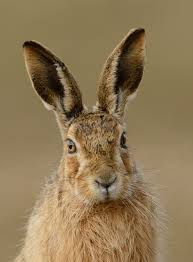记忆方法
1. hare "野兔",做动词讲是“飞跑”之意,因为野兔跑得很快,但是 hare (v.) 的古义并不是“飞跑”,而是“harry, harass, frighten”,这是源于 harry 或者与 harry 同源,因此可以说 hare (v.) 是先受 harry 的影响,后受到 hare (n.) 的影响,在这两个单词的影响下就变成了如今的含义,野兔在受到骚扰、惊吓的情况下肯定会飞跑逃命的。
2. hare (v.) 今义“飞跑”=> 古义:harry, harass, frighten => har- "harry, harass, frighten": harry (双写r加-y), harass.
3. 因此 harry 与 harass 是同源近义词,都表示骚扰、侵扰;使烦恼、苦恼。
hare 野兔——hair毛发,头发
口诀:野兔在长毛。
2. hare (v.) 今义“飞跑”=> 古义:harry, harass, frighten => har- "harry, harass, frighten": harry (双写r加-y), harass.
3. 因此 harry 与 harass 是同源近义词,都表示骚扰、侵扰;使烦恼、苦恼。
hare 野兔——hair毛发,头发
口诀:野兔在长毛。
中文词源
hare 野兔
可能来自PIE*kas,灰色,灰白色,词源同hazy,hoar,canus(拉丁文,灰白的)。后指灰白色的野兔。
英语词源
- hare
-
hare: [OE] The hare seems originally to have been named from its colour. The word comes from prehistoric West and North Germanic *khason, which also produced German hase, Dutch haas, and Swedish and Danish hare, and if as has been suggested it is related to Old English hasu ‘grey’ and Latin cascus ‘old’, its underlying meaning would appear to be ‘grey animal’ (just as the bear and the beaver are etymologically the ‘brown animal’, and the herring may be the ‘grey fish’). Harrier ‘dog for hunting hares’ [16] was derived from hare on the model of Old French levrier (French lièvre means ‘hare’, and is related to English leveret ‘young hare’ [15]); it was originally harer, and the present-day form arose from confusion with harrier ‘falcon’ [16], a derivative of the verb harry.
=> harrier, herring, hoar - hare (n.)
- Old English hara "hare," from West Germanic *hasan- (cognates: Old Frisian hasa, Middle Dutch haese, Dutch haas, Old High German haso, German Hase), of uncertain origin; possibly the original sense was "gray" (compare Old English hasu, Old High German hasan "gray"), from PIE *kas- "gray" (cognates: Latin canus "white, gray, gray-haired"). Perhaps cognate with Sanskrit sasah, Afghan soe, Welsh ceinach "hare." Rabbits burrow in the ground; hares do not.
þou hast a crokyd tunge heldyng wyth hownd and wyth hare. ["Jacob's Well," c. 1440]
- hare (v.)
- "to harry, harass," 1520s; meaning "to frighten" is 1650s; of uncertain origin; connections have been suggested to harry (v.) and to hare (n.). Related: Hared; haring.
权威例句
- 1. Monks shave their heads, as do devotees of the Hare Krishna movement.
- 和尚要剃度,克利须那派教徒也一样。
- 2. We can organise car rental from Chicago O'Hare Airport.
- 我们可以安排提供从芝加哥奥黑尔机场出发的租车服务。
- 3. This isn't the first hare-brained scheme he's had.
- 这已经不是他制定的第一个愚蠢方案了。
- 4. The tortoise wins the race while the hare is sleeping.
- 兔子正睡觉时,乌龟赢得了比赛.
- 5. He is as swift of foot as a hare.
- 他跑得像兔子一样快.
